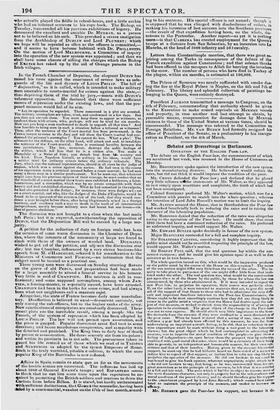In the French Chamber of Deputies, the eloquent DUPIN has
raised his voice against the enactment of severe laws as safe- guards of the life and dynasty of Louis PHILIP. The bill of " disjunction." as it is called, which is intended to make military men amenable to courts-martial for crimes against the state,— thus depriving them of the trial by jury,—meets with Duerar's vehement opposition. He declared that there were sufficient means of repression under the existing laws, and that the pro- posed measure would fail of its aim.
" Let its operation be regarded. Those concerned in a plot are arrested. The military accomplices are taken, tried, and condemned in a few days. But you dare out execute them. You must keep them to appear as witnesses, to confront them with others, who, perhaps, will not he tried for six months. How can you keep a man condemned to death in anguish all that time ? And how horrible to bring men in such a situation before a tribunal as witnesses! Then, after the sentence of the Court-martial has been pronounced, is the Crown lawyer to conic to the Jury and tell them the Court-martial had con- demned the prisoner's accomplice ? You cannot do less. What a plea! The advocate for the defence, on the other hand, will attack and seek to invalidate the sentence of the Court-martial. Here is continual hostility between the two Jurisdictions. The law, moreover, destroys the noble feelings of the soldier, which tell him that he is a citizen also. You make a Mameluke or as Swiss of him; you detach him from his country and his kind. Even Napoleon himself, so military in his ideas, would have a soldier tried fur ordinary crimes before the ordinary tribunals. The Jury, which was the national representative, should in all cases be the judge of treason, which was a crime against the nation. He had seen in the course
of his experience many a criminal accused before a court•inartial; he bad seen many a brave man in a similar predicament. Yet he must say, that whatever might have been his previous opinion of their courage, he must confess that on the threshold of u court- martial these brave men exhibited a feebleness, a faint-
heartedness, and a cowardice, which was by no means compatible with their known and well.estahlished character. What he had remarked in the culprits, he had also perceived in the Judges, for instance, there were Judges wits sat
on a court-martial, and who, like the Judges of the Duke d'Enghein, would be found to be so ignorant of the common law of the land, that they would con- demn a man brought before them, after being illegitimately seized in a foreign territory, and condemn such a man to death in the teeth of all international jurisprudence, merely because military men had learnt but one lesson—viz. that of passive obedience."
The discusion was not brought to a close when the last mails left Paris ; but it is expected, notwithstanding the opposition of DUPIN, that the Disjunction Bill will be carried by a large ma- jority.
A petition for the reduction of duty on foreign coals has been the occasion of some warm discussion in the Chamber of Depu- ties, where the interests of the community at large are fbund to
clash with those of the owners of wooded land. DUCHATEL wished to get rid of the petition, and adjourn the discussion sine die; but the Chamber, influenced by a very clever business-like speech from M. D'HARCOURT, referred it for consideration to the Ministers of Commerce and Finance,—an intimation that the subject must be treated as a practical one.
Three young men were discovered on Sunday strewing flowers on the grave of old PEPIN, and preparations had been made for a large assembly to attend a funeral service in his honour. Very little is said of CHAMPION. His mistress is still in con- finement; and some supposed accomplices, among whom JAN- VIER, a fencing-master, is especially named, have been arrested. CHAMPION had been in the hulks for some crime, and had always been what our neighbours call a manna's sttjet. Altogether, the state of France becomes daily more unsatisfac- tory. Disaffection is believed to exist—discontent certainly, not only among the sub-officers, but in the higher ranks of the army. New ramifications of conspiracies are constantly discovered. These recent plots are the inevitable result, among a people like the French, of the system of repression %%hick has been adopted by Lotr.s PHILIP. The law will not permit open association, and the press is gagged. Popular discontent must find vent in some direction; and hence murderous conspiracies, and ssmpatIly with the detected nod punished. The King lives iu daily fear of death by poison or assassination. Ile dares scarcely stir from his palace; and within its precincts he is not safe. The precautious taken to guard his life remind us of t hose which we read of in TAcirus and SUETONIUs us adopted by the tyrant Emperors of Rome. Such is the truly wretched, pitiable cmdition, to which the once popular King of the Barricades is now reduced.


























 Previous page
Previous page